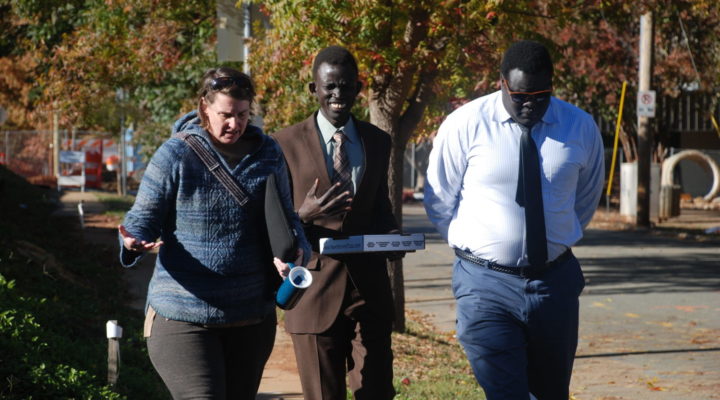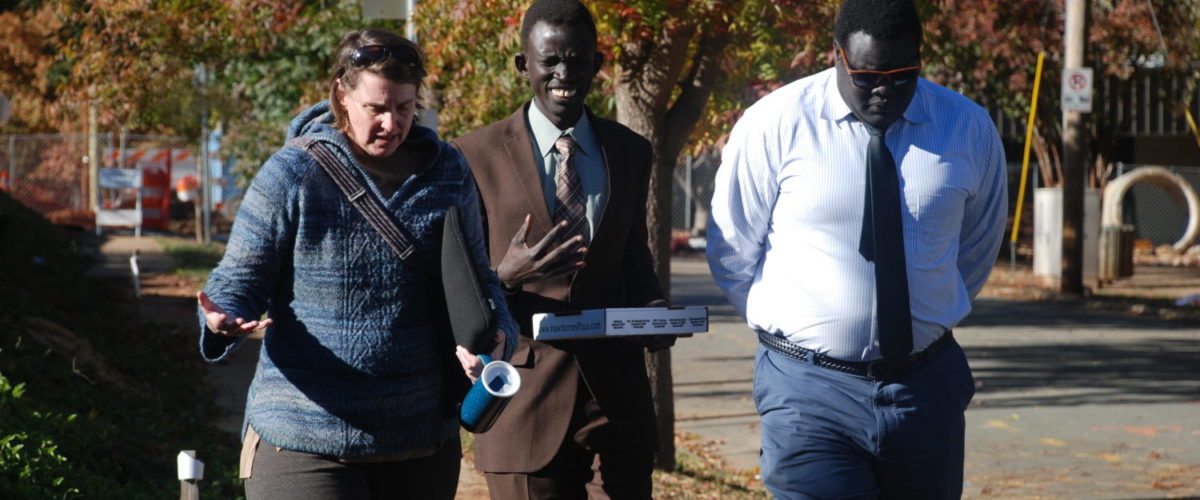 Martha Kearse knew the young men were out of their element as soon as she saw them milling in bewilderment at the grocery store’s vast array of options.
Martha Kearse knew the young men were out of their element as soon as she saw them milling in bewilderment at the grocery store’s vast array of options.
Very tall, very thin and very confused, they stood out like flies in a glass of milk. Kearse suspected they were some of the Lost Boys of South Sudan that she’d seen featured on the TV news magazine 60 Minutes.
She approached one wearing a colorful African shirt and asked where he got it. That started a conversation, and she offered to help them navigate what surely to them was an overwhelming cave of treasures worthy of Aladdin’s wonder.
After helping them select food, she gave them her phone number and encouraged them to call if they needed help.
Her phone was ringing when she walked through her door at home.
On that May day in 2001, Kearse was “just” a member of St. John’s Baptist Church in Charlotte, N.C. But her church has a worldview that embraces “the other” and she immediately started to talk up the young men and their needs in the congregation.
Maggie Bond, a tinderbox always one spark away from flaming into action, caught fire and passed a sock around to Sunday school classes. She collected $600. “You can’t tell me somebody’s hungry and me not do something about it,” she said.
Their story was fresh in the news. From 1983 to 2005, a civil war in Sudan over a battle to control natural resources had torn apart their country, costing the lives of as many as two million. It was dangerous to be a boy on either side of the battle lines. Soldiers killed or maimed boys to keep them from maturing into soldiers.
Consequently, as many as 20,000 — some say 40,000 — boys of the Nuer and Dinka tribes, many of them 5 to 7 years old, trekked a thousand miles or more across desert and jungle, to Ethiopia and then to Kenya, trying to find a safe place to settle. Likely half the boys died on the journey from starvation, drowning, wild animals and crossfire.
Ten thousand made it to the massive Kakuma refugee camp in Kenya, where they waited, hoping for a permanent home.
The name “Lost Boys of Sudan” was colloquially used by refugee camp aid workers to describe the horde of boys who trickled into the camp without parents or any adult supervision. Their leaders were as young as 12.
After 14 years, about 3,800 of them were accepted as refugees to the United States, including about 40 to Charlotte.
Because of Kearse’s early contact with the group, they migrated to St. John’s. Many were Christian, having been reached through Episcopal and Catholic ministries at the refugee camp.
The congregation embraced them immediately, encouraging, mentoring, feeding and providing personal instruction on the baffling machinations of American life. They’d never had electricity or plumbing so a simple thing like turning on the lights or faucet was magical.
Everything was a mystery. They needed to learn to keep a refrigerator door closed; that crackers don’t need to be cooked; that Americans appreciate people who shower regularly; that if you step off a curb without looking you’re going to get hit by something far deadlier than a goat.
And that, yes, with proper preparation, you really can produce from the powder inside the box of Bisquick the food pictured on the outside.
These “boys” were young men who endured hardships unimaginable, who were wise in human relationships, and who knew survival skills beyond the grasp of a Navy Seal.
But they were very tall infants born into an alien world. The people of St. John’s embraced them, mentored them, helped to clothe and transport them to work and to school, and to navigate the maze of life that is second nature to any mouse born into it.
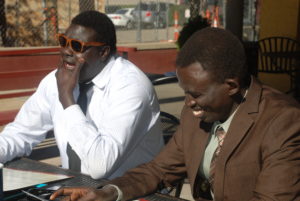
Over pizza on a cool fall day, Abraham, left, and Joseph, talk about their trials in establishing professional lives in America. Both have college degrees but are severely underemployed – likely because of their strong accent that is difficult to understand. Yet, Dinka cling to their language and culture to preserve it unto the next generation.
Teaching them to drive was the worst.
American children are learning to drive from the time they’re in a car seat. By observation, they absorb the nuances of cars, roads, traffic lights, patterns, lanes and turns so that when they get behind the wheel for the first time, that aspect of driving is almost second nature.
Now think of teaching a young man to drive a car on busy American streets whose sole mode of transportation until he left camp on a bus to fly to the United States was sandals or ox cart. Samuel backed into another car in the parking lot within two seconds of putting a car into gear.
These boys quickly became more than recipients of good will and Christian charity. They became family.
When Nancy Fuller married again, she blended her four children with her new husband’s two. They agreed to “adopt” Abraham from the Lost Boys and, Nancy said, “He became our only ‘ours.’ He brought us all together.”
“He was a wonderful gift to our family,” she said. When her husband died, Abraham traveled across the country to see her, and he never forgets a Mother’s Day.
Reconnecting with St. John’s
As immersed in St. John’s as the refugees were and as embraced as they felt, the young men eventually coalesced around their own culture, grew independent, educated and employed. They reconnected with cousins and moved if there was a better work opportunity elsewhere in the country.
After about 10 years of saving money, some found wives from South Sudan, and they established independent lives. That meant less involvement at St. Johns.
But during a special service in November under the influence of Moses Joknhial, an aircraft mechanic newly arrived from Philadelphia after 14 years in South Dakota where he had started a Dinka congregation, the Lost Boys established a congregation unique to them, hosted at St. Johns. Their services will be in their heart language and their culture will be transmitted to their children.
A reception after the service was an open-armed reunion as host families, sponsors and “adoptive” parents embraced the young men they’ve known for 16 years. Some brought wives and children, and all wore suits and smiles that split their dark faces like a sunrise.
All the mentors are “mom” and “dad” to the young men. The walls of the reception hall are covered with photos and newspaper clippings from the earliest days when they first arrived in Charlotte, wide-eyed and hungry.
“We are different people now because they have been in our lives,” said Kearse who joined the staff of St. John’s in 2001, and eventually became the associate pastor. (She resigned in 2018 to become pastor of Peakland Baptist Church in Lynchburg, Va.)
“They taught us about the welcome of community. They taught us about things we would never have imagined.”
It is important to the Dinka that they establish a language church. “We need to teach our children where we came from and what we went through,” said Moses, holding 13-month-old Nhial on his knee. “We want to raise the children in the church, and we want our services to be a reunion and fellowship for South Sudanese people in Charlotte.”
“We have our kids,” said Deng, another alumnus of St. John’s. “We want to show them how to worship in our language.”
“I’m not sure they ever thought of this as truly their church,” Kearse said. “It was more a place where kind Christian people were kind to them and included them. But when they created church, they created it among themselves.”
Now they want to reconnect with the Christian fellowship that embraced them by having a Dinka congregation in the facility where their adoptive families worship.
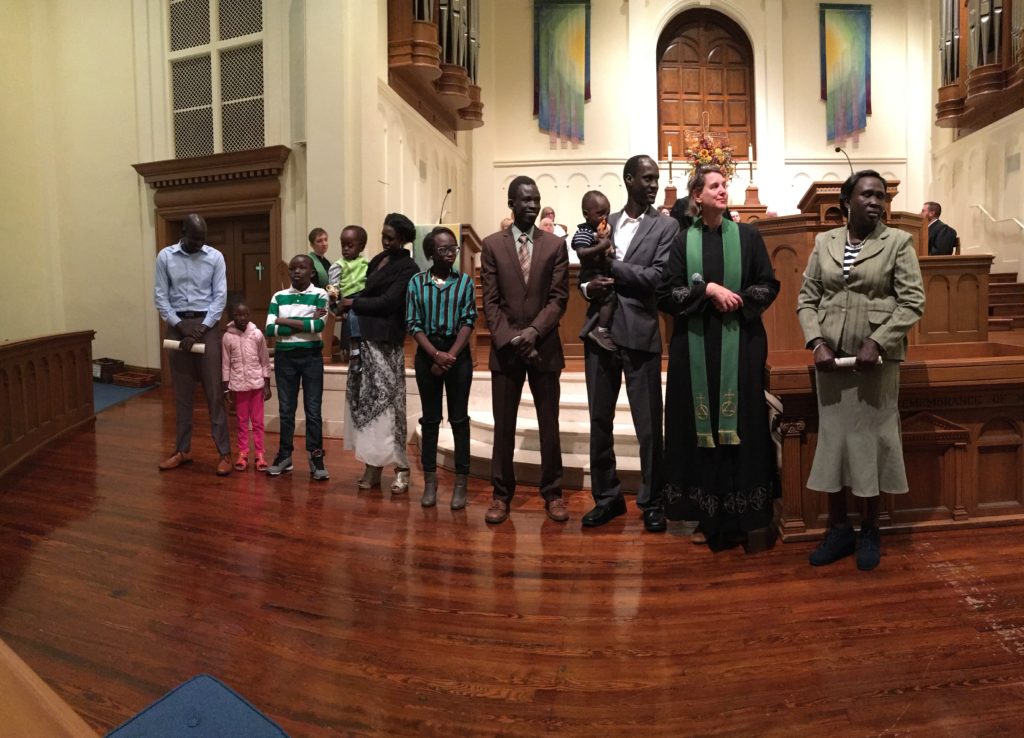
Lost Boys and their families were commissioned to start a Dinka language church at St. John’s Baptist, the church that welcomed them when they went from being “lost” in the Sudan, to being lost as new refugees in America in 2001. Martha Kearse, instrumental in leading the church to embrace them, is second from right. She has just moved to become pastor of Peakland Baptist Church in Lynchburg, Va.
“The main thing is for the children, our kids,” said Moses. “If they grow up in the church, we influence them at this moment and it will be less headache later on when they’re in high school and going to college. It is good to influence the children to know where we came from and what it’s like to grow up in the church.”
It’s important to the adults that their children learn their heart language because so much of heritage is tied to language. The children learn English through many avenues, he said, but “when you try to speak Dinka, they will look at you as if something is not right.”
One of the tenants of Dinka culture is never to steal, even if you are hungry. No one may know of your theft, but “it goes on your permanent memory record,” said Joseph Majak, a trained accountant who is greatly underemployed.
One reason Dinka have a difficult time getting work that their education merits is that even after almost two decades in the U.S., their accent is very heavy. In professional venues, clients are unlikely to entrust their resources to a person whose diction is not easily understood.
Moses did not come with the original group to Charlotte. When he and 44 other Lost Boys boarded a plane in Nairobi on Sept. 10, 2001, they were bleary-eyed and tired from days of celebrating the news that they were leaving war and hunger behind, and coming to America — a safe place.
Then they landed in St. John, Newfoundland, instead of New York. They sat on the runway for eight hours as all air traffic over the U.S. was grounded following the attack which occurred while they were in the air on Sept. 11. The news was a dramatic shock.
They spent eight days in Canada before being admitted to the U.S.
“At the time we couldn’t believe what happened here,” Moses said. “We thought those terrorists were following us, the same as happened to us in 1987 when people were dying in the desert, eaten by lions, drowning in river.”
Maggie Bond and her husband R.D. lived with their three children in a 1,000-square foot house when the Lost Boys came to their attention. One of the Lost Boys was actually a woman with a child she couldn’t care for while working and trying to acclimate to the U.S.
The child, Aluel, stayed with the Bonds five days out of seven for two years, and on occasion, 24/7 when her mom had to return to Sudan to care for a family member. Looking back on the cramped conditions, Bond simply said, “To whom much has been given, much is expected.”
The only real cost to her and her family she said, was “a broken heart at times.” Her own children’s lives were “enriched” she said. She never left them behind to care for Aluel, and they “never wanted for anything.”
Instead, they each claim a baby sister named Aluel.
“It’s not that I did something so wonderful or special,” Maggie said. “But she’s mine and will be mine ‘til the day I die. I gave her everything I gave my own children.”
It “means a lot” for the boys to come back to St. John’s to start a Dinka congregation.
“It’s kind of a selfish thing,” she said. “They came to us when they had nothing and they’ve grown and blossomed and are having children. It’s like having your own kids come back to church.
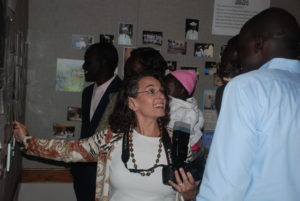
Dynamo Maggie Bond jumped in immediately to raise food funds for the refugees and virtually adopted the daughter of one refugee for two years while the mother dealt with long distance family issues.
“This does something for me. They’ve come back to roost. I get to see them again, to touch them and squeeze’em and tell them I love them.”
“One of the things the South Sudanese give me is a reminder that I don’t have all the answers,” Kearse said. “I don’t come from a position of power, glory and wealth to hand things down to them. They have things they give to me, such as a wider worldview, resilience. It’s a gift they’ve given to me. When I watch the news and I hear ‘Uganda’ my ears perk up because I have family now who are affected by what happens in Uganda.”
“God called them and said, ‘There’s this woman and her friends who don’t know anything about the world. Go teach them about inclusion. That’s your mission.’”
She relishes the fact that current members of St. John’s youth group have never been unaware of South Sudan or been unable to locate it on the globe.
When the Lost Boys were acclimating to their new surroundings, they would gather in the parking lot of their apartment complex to chat, standing in jeans and T-shirts in 35-degree weather. St. John’s people saw that and brought them stocking hats, jackets, gloves and scarves.
“There’s a lot of mothering that happened,” Kearse said. “They missed a lot of mothering.”
A childhood lost
Their lives before the war were almost idyllic. They went to school a few months each year and spent the rest of their time out with other boys, caring for cattle, free to roam. Then came the schism and they were torn from their families and thrust into survival mode for years.
Their experience was so intense that no one who didn’t go through it can relate, which makes their own community hard to penetrate beyond a surface level.
Moses said when the boys fled their villages in fear, they assumed they would be returning the next day. Instead, they kept walking. Days were reduced to “sunrise” and “sunset.” They skirted villages, and traded clothes for food if necessary, although they had little more than what they wore.
“If you had a knee or foot problem, that’s it, you’re done,” said Moses, aged 9 at the time.
Actually, any age or birthday claimed by any of the boys is an estimate. There are no birth certificates and because none of them knew their birth dates, immigration authorities assigned them all Jan. 1 as their birth date.
Of course, the wandering boys never did return home. Instead, they walked 1,000 miles in the next three months until they got to a camp in Ethiopia where they stayed four years, before heading for Kenya.
Before they fled, growing up in their villages, the children were sheltered from death. They didn’t attend funerals or see corpses. During the long walk, boys saw others killed by lions, drowned in rivers, caught in crossfire of warring factions, and dropped by starvation.
The boys overwhelmed the massive Kakuma Camp in Kenya, in part because they had no adults in charge. Although they had survived horrific experiences that most adults never would, emotionally and intellectually, they were still children.
Camp life was hard and they would receive one meal a day at best. Some days there was no food. They told stories to pass the time and forged bonds forever unbroken no matter how distant their relocations might separate them.
“I would be driving in the neighborhood and see them and they would be holding hands,” Kearse said. “It was very sweet. Their bond to each other was enormous and they kept each other alive. Their bond endured when they came here, they loved each other very intensely.”
The presence of church in the camp made life tolerable, according to Abraham Garang, a graduate of Lynchburg College and now a limo driver and one of the Lost Boys who shared lunch with Kearse after the reception at St. John’s.
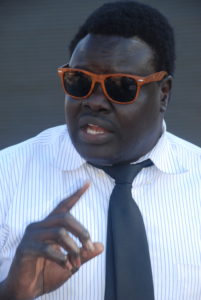
Abraham Garang, with a degree from Lynchburg College, is a limo driver in Charlotte. Lost Boys often are underemployed due, at least in part, to heavy accents.
“Church was not just to preach about God,” he said, with an enthusiastic intensity that belies the tragedy through which he’s lived. “It also provided counseling. People were depressed. We were losing people left and right.”
To combat that depression, the camp church sponsored dance performances. Kids competed to be able to dance in front of the church and in front of crowds at the camp. When a child was selected to perform, it made their week. It gave them a goal, something to do.
“It limited the time you had to think of your miserable life,” said Abraham.
“It’s interesting how few of them have crumbled under the weight of their experience,” said Kearse. “Amazingly, coming out of what they came out of, very few of them had issues [with drugs and alcohol]. They have happy marriages, happy children. They work hard and believe in education. They’re getting to the place where the second generation is starting to go to college and to be American.”
It took the boys about 10 years before they started getting married. They needed to save enough money to go to South Sudan and find a wife. They do not intermarry with Americans. It is imperative to them to retain their culture.
Kearse said the women are “unbelievably strong, physically, mentally, emotionally. They keep their families together by sheer force of will.”
Some of the young men are married to women who remain in South Sudan — even for years — navigating the red tape maze to get permission to immigrate.
The Lost Boys remain committed to South Sudan’s well-being. Many drove five hours each way either to Atlanta or to Washington to vote an absentee ballot in the election that formed South Sudan as a separate nation. The diaspora hasn’t given up their love of South Sudan, even as they’ve become Americans.
One of the boys, James Mijack, graduated from Mars Hill College and works for an oil company. He started a foundation to raise money to build a school in South Sudan, proving wrong those who said, “It can’t be done.”
Kearse has been to the school, which she said is the nicest building in a 50-mile radius, even though there is no road leading to it.
“I think if America took two seconds to see where South Sudan is, a million dollars to build roads and schools would go a long way,” Kearse said. South Sudan is about the size of Texas.
According to UNICEF, the largest population of Sudanese refugees in the United States is in Omaha, Neb., which hosts about 7,000.
This changed people
Moses Joknhial is encouraged about the Dinka congregation. It meets bi-weekly and he anticipates it growing in strength to support at least a part-time pastor/leader. The church he started in South Dakota has two ordained priests.
He is totally committed to the value of the church for the next generation. “They will be knowing God, what to do and what not to do, that is the main thing,” he said.
Blythe Taylor was associate pastor of St. John’s in 2001 when Kearse told the congregation, “I’ve told these young men that my church will welcome them.”
“She made us step up to the plate,” said Taylor, now assistant director for academic support at Barton College in North Carolina.
Taylor quickly organized committees to cover the Lost Boys acclimation and assimilation into American life: education, healthcare, daily life skills and finances. Church members volunteered for areas that utilized their gifts and she established a fund to help them go to the local community college.
Some members volunteered for watch care, “adopting” one or two boys, embracing them as sons, and being called “mom” and “dad” to this day.
One of those families was Carl and Nina Philips, recently retired at the time. They had two computers and a willingness to teach so they ended up mentoring at some level nearly all the boys. Thirteen of them went to college and at least two earned graduate degrees.
“We completely turned our lives over to them for a period of several years,” said Nina. “That was the main activity of our lives.”
At least once a month the Philips would provide a big meal and it wasn’t unusual for 15 to come, hang out and use the computers.
While the Philips and other mentoring families embraced the opportunity to serve, they also found the young men so easy to relate to that their service was enjoyable. “They were outgoing, appreciative, so eager to learn,” Nina said. “We just fell into it so easily because of their receptiveness. “
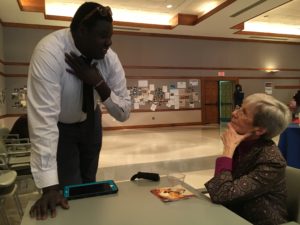
Abraham Garang, a graduate of Lynchburg College and now a limo driver, shares memories with Nina Philips, who, with her husband Carl, opened their home for meals and computer training.
And St. John’s, unlike many — maybe most — Baptist churches of that time was receptive to Africans in the church. They had a few African-American members, so the Sudanese coming “was not a big event.”
As technology advanced and cell phones grew ubiquitous, the boys learned slowly of the status of family in Sudan. They had gone years not knowing if their families lived or died.
Somehow David Thon’s father learned he had come to the United States and he tracked his son down through a relative in Canada.
His father’s first call came to his apartment while David was at work. His father called back the next night and they talked for the first time in 12 or 13 years.
In 2013 David took his wife and child to visit his father in the village. Renewed fighting broke out and they fled. His father — a prominent man in the village with several wives and cows — is back in a refugee camp in Uganda.
Cell phone technology changed their lives. Carl recalls one young man riding in the car and taking a call — from his cousin in Sydney, Australia.
Fifteen years later, the pain is still evident as the Philips recall innocence shattered. The Lost Boys came to the U.S. with no awareness of racial discrimination. But when the security guard at Walmart doesn’t believe that you paid for the shoes you’re walking out with, even though you show him the receipt; and when a policeman stops you while you’re driving to work through a white neighborhood and asks, “Whose car is this?” you learn quickly that being suspicious for “driving while black” is a real thing in America.
The Lost Boys “opened our eyes in many ways,” Carl said, including prompting a worldview they never had before.
“It really makes you angry when you hear the president of the United States speak in disparaging terms about the continent of Africa,” Carl said.
There are many success stories. David Thon graduated from Mars Hill and Emory and worked for the Carter Center in Atlanta, which sent him back to Sudan to work on eradicating guinea worm.
Madut Bul and others enlisted in the military. He recently sent to the church a framed U.S. flag that had flown with him on a combat mission over Afghanistan.
“I’ve never seen a church that lived up to its covenant in the way St. John’s did,” Taylor said.
That covenant includes phrases such as, “We will not let our differences separate us” and “We will be a servant church.”
“Martha Kearse gets a lot of credit for believing in the church enough to have them believe they really could be a servant church,” Taylor said.
“I have a sense of awe in who the St. John’s volunteers have been with those young men and have transformed their lives,” said Taylor. “It took a lot of bravery on the part of the young men to be helped and to let us teach them.”
The biggest takeaway for Taylor was the sheer volume of the commitment and its longevity. “I don’t know that I understood at the time the longevity of the commitment. But I understood that something was big about this, and it seemed to get bigger and bigger as we became more and more connected with them.”
“I hope for St. John’s that is the part that’s been transformative for them,” she said. “Most churches just give money and send people on mission trips. Frankly, a lot of that is toxic charity because it doesn’t change anything, it just makes us feel good about doing something. This changed people. And that’s how service in the name of Christ should be.”
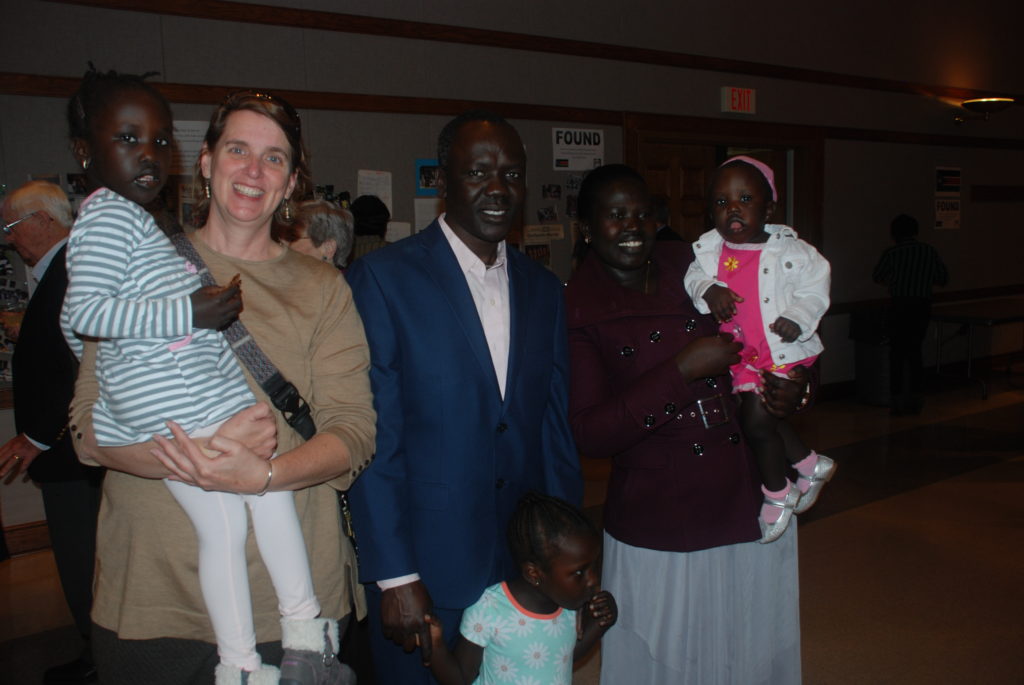
Samuel Awar has established a family since he came to America after surviving the death march through the African jungle. Martha Kearse holds some of Samuel’s family, with his wife, Akur.
View more in the Lost Boys Series
Photo Gallery: Lost Boys in photos
Related news:
Bucking anti-refugee attitudes, small N.C. church opens ‘welcome house’
America needs refugees ‘to show us how to love each other,’ agree church resettlement volunteers
Richmond grateful for growth of Burmese refugee ministry
Churches helping refugees despite fear and rhetoric, say those involved in resettlement
Related commentary:
Humility, kindness and welcome: Hard but biblical callings | David Jordan
A lavish welcome to the table | Amy Butler
This series in the “Welcoming the Stranger” project is part of the BNG Storytelling Projects Initiative. In “Welcoming the Stranger,” we share the inspiring stories of the people and faith communities that are teaching us all to love our neighbor as ourselves.
_____________
Seed money to launch our Storytelling Projects initiative and our initial series of projects has been provided through generous grants from the Christ Is Our Salvation Foundation and the Eula Mae and John Baugh Foundation. For information about underwriting opportunities for Storytelling Projects, contact David Wilkinson, BNG’s executive director and publisher, at [email protected] or 336.865.2688.

